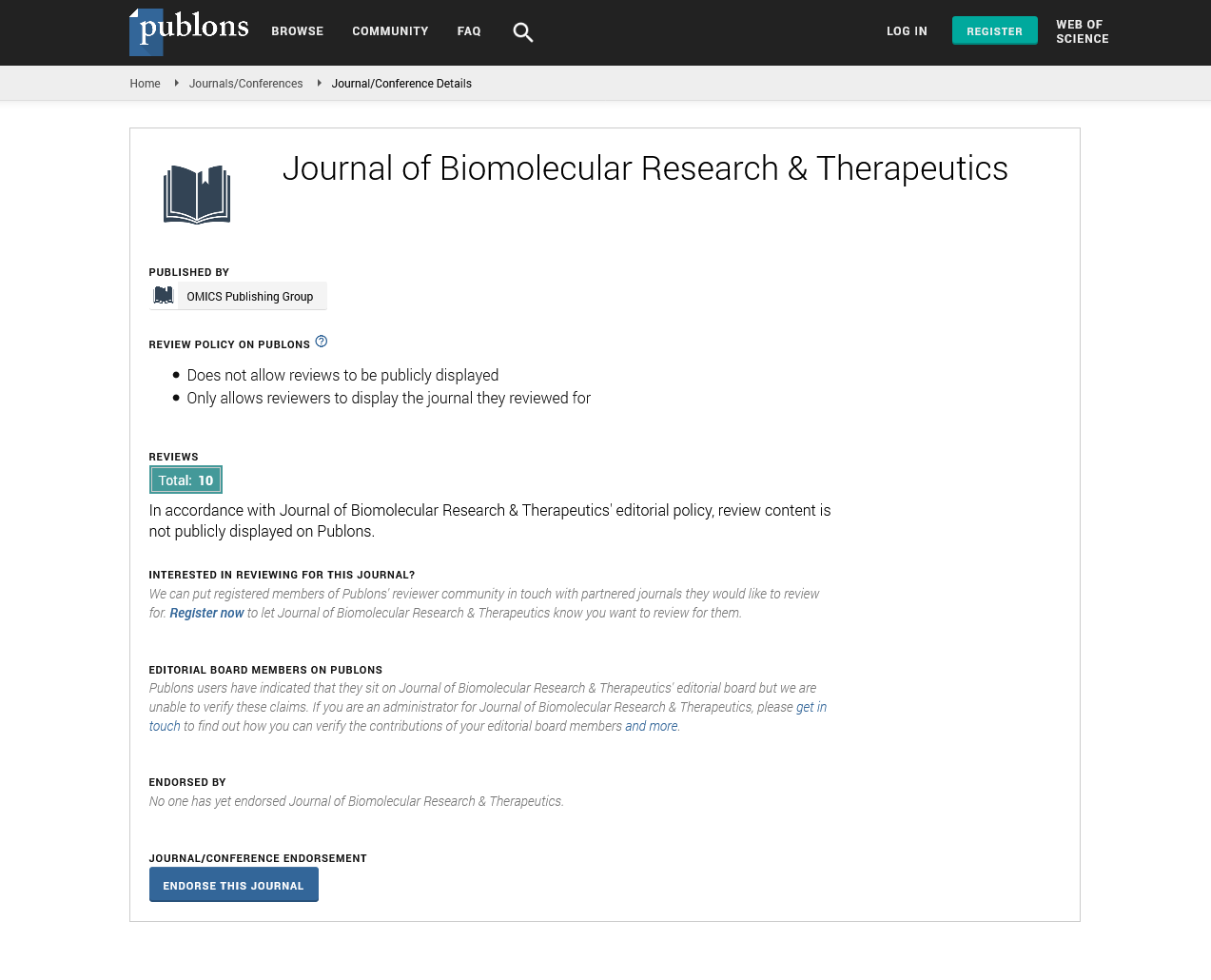Indexed In
- Open J Gate
- Genamics JournalSeek
- ResearchBible
- Electronic Journals Library
- RefSeek
- Hamdard University
- EBSCO A-Z
- OCLC- WorldCat
- SWB online catalog
- Virtual Library of Biology (vifabio)
- Publons
- Euro Pub
- Google Scholar
Useful Links
Share This Page
Journal Flyer

Open Access Journals
- Agri and Aquaculture
- Biochemistry
- Bioinformatics & Systems Biology
- Business & Management
- Chemistry
- Clinical Sciences
- Engineering
- Food & Nutrition
- General Science
- Genetics & Molecular Biology
- Immunology & Microbiology
- Medical Sciences
- Neuroscience & Psychology
- Nursing & Health Care
- Pharmaceutical Sciences
Opinion Article - (2022) Volume 11, Issue 1
Protein Importance and their Function in the Human Body
Salomon Jose*Received: 28-Dec-2021, Manuscript No. BOM-22-43256; Editor assigned: 31-Dec-2021, Pre QC No. BOM-22-43256; Reviewed: 14-Jan-2022, QC No. BOM-22-43256; Revised: 19-Jan-2022, Manuscript No. BOM-22-43256; Published: 26-Jan-2022, DOI: 10.35248/2167-7956.22.11.194
Abstract
Proteins are the tough complex macromolecules of biological importance the play a major role in the human body. Proteins are highly essential and have a great nutritive value and directly involved in the chemical process. Protein molecules are much larger than sugar and salt molecules and are composed of many amino acids linked by long chains, much like the pearls are located on a string. There are about 20 types of amino acids that are naturally present in proteins. Proteins with similar functions have similar amino acid compositions and sequences.
Keywords
Minerals; Nutrients; Macromolecules
Introduction
Plants can synthesize all amino acids. All animals are vital to life. Plants can grow in media containing inorganic nutrients that provide nitrogen, potassium and other substances that are essential for growth. They use carbon dioxide in the air during photosynthesis to form organic compounds such as carbohydrates. However, animals need to obtain organic nutrients from the outside. Due to the low protein content of most plants, animals such as ruminants (such as cattle) require very large amounts of plant material as they only eat plant material to meet amino acid requirements. Non-ruminants, including humans, obtain protein primarily from animals and their products-eg: meat, milk, eggs. Legume seeds are increasingly being used to prepare cheap protein- rich foods.
The protein content of animal organs is usually significantly higher than that of plasma. For example, muscle contains about 30 percent protein, liver contains 20 to 30 percent, and red blood cells contain 30 percent. High levels of protein are found in low water content hair, bones and other organs and tissues. The amount of free amino acids and peptides in animals is much less than the amount of protein. Protein molecules are produced intracellular by a continuous assembly of amino acids and are released into body fluids only after synthesis is complete.
Significance
The high protein content of some organs does not mean that the importance of proteins is related to their abundance in an organism or tissue. On the contrary, some of the most important proteins, such as enzymes and hormones, have been found in very small amounts. The importance of proteins is primarily related to their function. Enzymes, which catalyze all metabolic reactions, enable organisms to build, convert, and break down the chemicals (proteins, nucleic acids, carbohydrates, and lipids) they need for life. Life without enzymes is impossible. There are several protein hormones that have important regulatory functions. In all vertebrates, the respiratory protein hemoglobin acts as an oxygen carrier in the blood, transporting oxygen from the lungs to the organs and tissues of the body. A large group of structural proteins maintains and protects the structure of the animal’s body.
Protein is found in every cell in the body, and it’s important to get enough protein to keep your muscles, bones, and tissues healthy.
The Protein plays a key role in body processes, including:
• Blood coagulation
• Fluid balance
• Immune system reaction
• Vision
• Hormone
• Enzyme
Protein is especially important for growth and development. The straight chain of amino acid residues is called a polypeptide. Individual amino acid residues are linked by peptide bonds and adjacent amino acid residues.
Some proteins have non-peptide groups attached to them, which may be called prosthetic groups or prosthetic groups. Proteins can also work together to perform specific functions, and they often bind to form stable protein complexes.
Conclusion
Protein is essential to life. It provides the essential amino acids needed for the growth and maintenance of our cells and tissues. Our protein needs depend on our life stages and most Europeans consume enough to meet their needs. Most people have a variety of diets, so as long as the total amount of protein meets your daily needs, the quality and digestibility of the protein you eat is not an issue. As we eat foods rather than nutrients, we need to choose protein-rich foods that not only provide essential amino acids, but also support a healthy and sustainable diet.
Citation: Jose S (2022) Protein Importance and their Function in the Human Body. J Biomol Res Ther. 11:194.
Copyright: © 2022 Jose S. This is an open-access article distributed under the terms of the Creative Commons Attribution License, which permits unrestricted use, distribution, and reproduction in any medium, provided the original author and source are credited.

